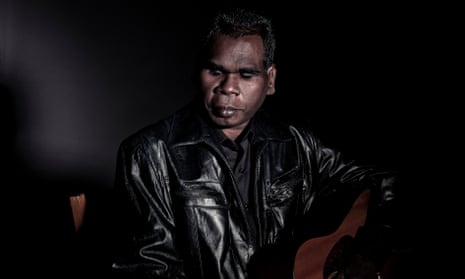What is “world music”?
Is it Bollywood sing-along, Zimbabwean prog rock or the Balkanesque via Melbourne ska groove of Cat Empire? Is it Rohingya mandolin lullabies or Welsh organ-grinding funeral dirges?
World music, let’s face it, is just a polite term for “miscellaneous music”. It’s a lazy organising principle lumping together all the music (and there is a lot of it) that falls outside of the usual whitebread rock or indie pop. And in this day and age something about the phrase just doesn’t seem right.
On Wednesday the Indigenous Australian musician Gurrumul took to a Sydney stage and received his Australian Record Industry Association award for best world music album. Gurrumul hails from Arnhem Land, in the northern part of Australia and sings in his native Yolngu language. He shares with all Indigenous Australians an ancestral relationship to the land that goes back more than 40,000 years. Yet his music is considered “world music” in a way that the music of other Australian singer-songwriters such as Paul Kelly or Courtney Barnett isn’t.
An Aria spokeswoman told Guardian Australia every label is free to apply for whichever category they feel is relevant to their artist. Indigenous performers “are and have been nominated across a range of categories”, including Jessica Mauboy for best female and best pop, Dan Sultan for best male and best rock, and Archie Roach for best blues and roots and adult contemporary.
Michael Hohnen, Gurrumul’s longtime collaborator and producer, told Guardian Australia he feels uneasy about the world music tag. “The only thing that Gurrumul does differently from every mainstream artist is that he sings in an Australian language. Australian languages are not a foreign language.
“It’s a shame when you sing in an Australian language that you get labelled ‘ethnic’,” he says.
Hohnen says the category as defined by the Arias includes Indigenous and “cross-cultural music”. Gurrumul and his family want to share his music as broadly as possible and recognition by the Arias assists in that, so they entered in the category knowing it was their best chance for a win. But he says the world music tag and the branding perception that comes with it is problematic.
“The world music scene can be quite restrictive,” he says. “It can be a bigger hurdle to jump over, a perception that’s difficult to shake.”
Hohnen co-founded the record label Skinnyfish in the Northern Territory and works predominantly with Indigenous Australian musicians, who often sing in languages native to Australia. Over its nearly 20-year history he has long felt perturbed that the Australian music industry might categorise the work of Indigenous artists as world music. “Once I found what the other musicians in that category sounded like, I didn’t think the label applied to us.”
He says world music is dominated by African traditions. “A lot of it is riff-based, groove-based chants. The kind of music Gurrumul plays doesn’t fit that musical style.”
The music Gurrumul, formerly a member of Yothu Yindi, crosses a number of musical genres, from blues to gospel and rock. The label has worked hard to push for him to be placed in broader musical categories. Hohnen says the artist himself “doesn’t listen to world music, ever. His influences are completely mainstream.”
High-profile critics of the world music term include the musician David Byrne, who came out swinging against the category in a memorable 1999 New York Times article. He called world music a “marketing” and “pseudomusical term”, and lambasted it as a “name for a bin in the record store signifying stuff that doesn’t belong anywhere else in the store”.
“It’s a label for anything at all that is not sung in English or anything that doesn’t fit into the anglo-western pop universe this year,” Byrne wrote.
“When we talk about world music we find ourselves talking about 99% of the music on this planet. It would be strange to imagine, as many multinational corporations seem to, that western pop holds the copyright on musical creativity.”
He said viewing people and cultures as exotic was a “distancing mechanism” that too often allowed for exploitation and racism.
The world of literature has mainly moved away from such outmoded categorisation, recognising it as hangover from the colonial era. These days it would be unthinkable to find writers such as Jorge Luis Borges, Umberto Eco, Gabriel García Márquez or Chimamanda Ngozi Adichie (author of the brilliant Americanah) given their own “world” or “ethnic” category. Diversity is built in to prizes like the Man Booker, where winners may come from Zimbawbe, New Zealand, Ireland or India.
Gurrumul received his award a few week before the main Arias ceremony, at an industry event where nominations for the main prizes are announced. Nonetheless, Hohnen says the artist was thrilled to win and “bought a new suitcase” to carry his award back to Arnhem Land. Belonging to the world music category hasn’t diminished his excitement, but “it’s great if he could be able to compete in the mainstream”.

